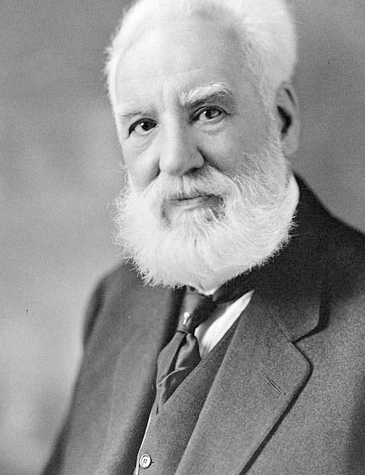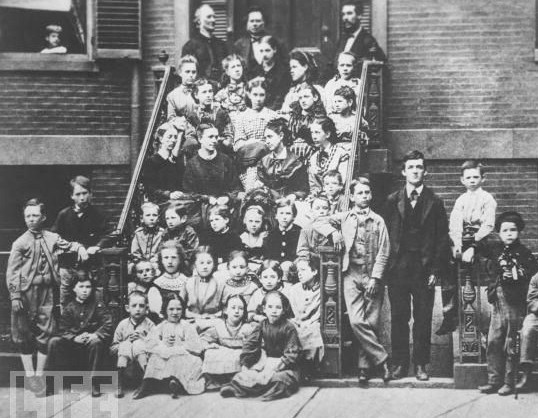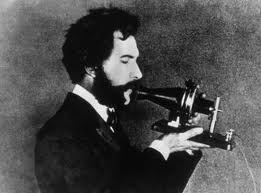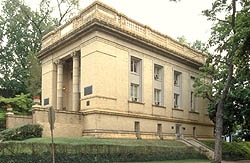 |
| Alexander Graham Bell (http://www.voicenation.com) |
“Probably no means of communication has revolutionized the daily lives of ordinary people more than the telephone. The actual history of the telephone is a subject of complex dispute. The controversy began with the success of the invention and continues today” (Phil Ament). Although the telephone has a large history, it all started with a man named Alexander Graham Bell. Bell was born in Scotland in 1847, but eventually moved to America and Canada. He took an early interest in helping deaf people; he worked at the first school for deaf people in Boston, and then founded the American Association to Promote the Teaching of Speech to the Deaf (Bell, Alexander Graham (1847-1922)). At 29 years old (1876), he and his group of lab workers transmitted the first human voices over a metal wire, which sparked a new age of communication. In 1877, he founded the Bell Telephone Company, the first telephone company, which is now one of the U.S. nation’s largest cell phone carriers ever, AT&T. (Bell, Alexander Graham (1847-1922)). Many others followed in the years after, but Bell eventually monopolized the communication industry (Mary Bellis). Late in life, he used his money to set up science labs, start magazines, and became a regent at the Smithsonian Institution (Mary Bellis). Bell was always kind enough to make sure people that had hearing issues had a successful future by helping with their education. This man had the determination to become someone in life by doing all the things he did. Alexander Graham Bell shows heroic characteristics through his sheer kindness towards others, and his strong determination for inventing.
 |
| AT&T originated from the Bell Telephone Company (www.streetinsider.com) |
Alexander Graham Bell demonstrated compassion towards others, with and without disabilities. At a young age, Bell started contributing to the advancement of the disabled community: "To help deaf children, Bell experimented in the summer of 1874 with a human ear and attached bones; he went to Boston in 1871 to teach at Sarah Fuller's School for the Deaf, the first such school in the world. He founded the American Association to Promote the Teaching of Speech to the Deaf" (Bell, Alexander Graham (1847-1922)). Bell sacrificed the young years of his adult life out of the bottom of his heart to provide aid to others that really needed help. He also did things to improve the way deaf people were taught the English language. Bell was such a kind man that he would travel from his home in Canada all the way to Boston to work at the deaf school. He undoubtedly had a bright future in mind for the deaf community because he created the AAPTSD in order to make sure they received the help they needed to live a long, prosperous life. It is also apparent that Alexander Graham Bell wanted to help people without disabilities in society who shared common interests with him: "Toward this end, in 1881, he used the $10,000 award for winning France's Volta Prize to set up the Volta Laboratory in Washington, D.C." (Mary Bellis). The lab served as a station for experimenting with transmitting sounds and recording them as well as an informational center for the deaf. Bell spent much time creating his inventions to gain the awards and money he did, but he still used them to help the U.S. community. He could have easily used the money for his personal gain, especially since that kind of money was worth a lot more during his time than it is now. Instead he used it to better the overall society. Overall, Alexander Graham Bell did many different things in his lifetime to help others in one way or another, instead of merely indulging himself.
 |
| Bell working at the first school for the deaf (http://www.life.com ) |
Hard work and determination led Alexander Graham Bell to become the successful man he is known as today. Once Bell invented the telephone, he had to overcome many obstacles to make it usable for the public: "After a year of refining the new device, Watson and Bell, along with Hubbard and Sanders, formed the Bell Telephone Company in 1877...by 1889, when insulation was perfected, 11,000 miles of underground wires traveled through New York City" (Sonia Benson). Bell had to spend many hard hours in and out of his lab to make his invention a product used by all. He had to have a great deal of will power to spend such a large number of his hours in his lab to create such a complex piece of work. It's also evident he worked very hard to get 11,000 miles of wire laid out so that his invention would be able to work. Bell had to face a large number of people that had some type of issue with his telephone and his telephone company: "Altogether, the Bell Company was involved in 587 lawsuits, of which 5 went to the Supreme Court; Bell won every case" (Bell, Alexander Graham (1847-1922)). There were many people that thought Alexander stole their ideas and invention as well as many other smaller issues during the first years of the phone. The motivation to keep going and not back down from what he believed in to all those other people who wanted something back from him is completely admirable. Without a doubt Bell was incredibly determined to not let his hard work go to waste and be taken away by some other party. Alexander Graham Bell had abundant energy to create his invention and keep it from being wrongfully taken away from him.
 |
| Bell speaking into his telephone (www.lazacode.com) |
Bell motivated us to be successful in life because of his passion towards helping others and his determination towards inventing. "In 1876, the first voice communication was made by means of impulses transmitted through wires... The Bell telephone was patented in the United States in 1876... after immigrating to the United States he became a professor of vocal physiology at Boston University" (Bell Invents the Telephone, 1876). Deaf people’s lives were greatly improved after Bell took an interest in them and how he could help this segment of society. Throughout, his success didn't just come to him, he had to work for it. Bell showed great persistence towards everything he did and helped other people have success like him throughout his whole life. If he did not have the strong will and kindness he had, Bell wouldn't have been nearly as successful financially or personally. This is why you and I should admire him and his accomplishments. As Bell once said: "What this power is I cannot say; all I know is that it exists and it becomes available only when a man is in that state of mind in which he knows exactly what he wants and is fully determined not to quit until he finds it... Concentrate all your thoughts upon the work at hand. The sun's rays do not burn until brought to a focus... A man, as a general rule, owes very little to what he is born with - a man is what he makes of himself" (Bell). Bell knew that you must have the determination or drive to achieve what you want in life, as well as show kindness and compassion for others when it was needed. His whole life inspires me in every way imaginable. He genuinely cared to stop and help those who needed it most, greatly improved the way deaf people were cared for, and aid others that had a passion for science and the advancement of our society. Bell was determined to work hours upon hours, fight in numerous court cases, and battle other competitors in his business no matter how hard it was to come out on top. I believe these two qualities are what it takes to be a hero.
 |
| The Volta Laboratory today (www.nps.gov) |
"Alexander Graham Bell Quotes." Brainy Quote, 14 Apr 2011. Web. 14 Apr 2011. http://www.brainyquote.com/quotes/authors/a/alexander_graham_bell.html
Ament, Phil. "Telephone." The Great Idea Finder, 26 Jan 2006. Web. 21 Apr 2011. http://www.ideafinder.com/history/inventions/telephone.htm.
"Bell, Alexander Graham (1847-1922)." Encyclopedia of World Biography. Detroit: Gale, 1998. Gale Student Resources In Context. Web. 31 Mar. 2011
"Bell, Alexander Graham." U*X*L Encyclopedia of U.S. History. Sonia Benson, Daniel E. Brannen, Jr., and Rebecca Valentine. Ed. Lawrence W. Baker and Sarah Hermsen. Vol. 1. Detroit: UXL, 2009. 148-150. Gale Virtual Reference Library. Web. 31 Mar. 2011.
"Bell Invents the Telephone, 1876." DISCovering World History. Online ed. Detroit: Gale, 2003. Student Resource Center - Junior. Gale. DEL NORTE HIGH SCHOOL. 31 Mar. 2011
Bellis, Mary. "Alexander Graham Bell- Biography." Web. 28 Mar 2011. http://inventors.about.com/library/inventors/bltelephone2.htm.
Page created on 4/25/2011 12:00:00 AM
Last edited 4/25/2011 12:00:00 AM
